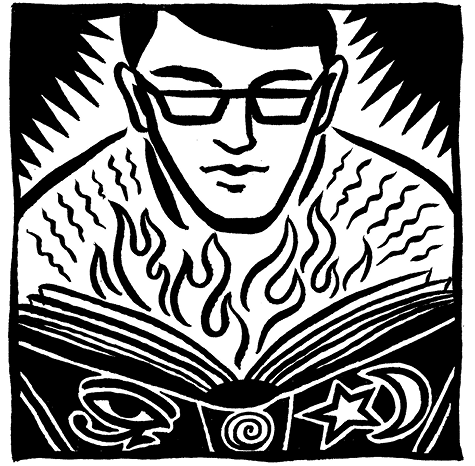Kicking It Up a Notch:
After Pagan 101

At some point in our spiritual lives—whether we practice Wicca, Druidism, Heathenry, herbalism, Witchcraft, or any other of the often lumped-together Pagan practices—we find we’ve dealt with all of the introductory content we can get our hands on. We’ve read books, explored web pages, talked to people, dabbled in practice, and maybe visited a group or festival or two. We’ve taken the first few steps, but now we’re unsure of what to do next. We take a deep breath, look around, and say, “Well. That was interesting. Now what?”
It’s time to take things to the next level.
But that’s often not as simple as it sounds. Store shelves are filled with Pagan 101 books geared toward the newbie, because it’s that excited neophyte who buys those materials. That’s where the big money is, so those books keep getting written. As for the web, enter “Pagan” or “Witch” or “Heathen” into a search engine and you’ll reap a million or more hits. But the quality is often low. Most will be overly simplistic, biased, incomplete, or poorly cited, and some will contain material that’s inaccurate and possibly even dangerous. Even worse, many will charge money for memberships that promise the sharing of “mysteries” or “secret initiations,” again drawing in novices as easy prey.
What’s a frustrated practitioner to do? How does one climb out of the 101 rut and find a new direction?
1. Begin with Self-Inventory
Consider your own Pagan origins. How did you begin your explorations? Were you born into a family that practices, or did you find the path on your own? Have you been practicing for years, or are you an eager beaver who wants more and wants it now? What path or tradition most interests you and why? Think back to what sparked your interest when you first began. Are you still feeding this flame, or does it need rekindling? Going back to your own beginnings and answering these questions can help you think about what it is you wanted at first, what you want now, and how to take new steps in that direction.
Use tools to help with the inventory. You can use your favorite method of divination to assess your progress or path. Or take a long walk outside, auguring the natural signs and considering the ways they speak to you. Meditation is a terrific way to reflect too. Neuroscience has shown that meditation directly affects the brain and, in turn, affects our ability to do magick and work with all things spiritual. Ponder a question you need answered, slip into a meditative trance, and see what develops.
Journaling is another valuable tool for insights. When you write by hand, you stimulate a specific part of your brain that heightens your attention and makes you more aware of your surroundings and internal thoughts. Freewriting—writing for five to ten minutes without stopping—can bring deep memories bubbling to the surface. Journaling about your path, your questions, the work and rituals you do, and your discoveries helps cement memory and stimulates forward movement. Using your journal as a sort of diary of progress will help in this way, too.
Researching your family tree and DNA may also help you direct your work. I had heard my family included a Native American background; I was interested in taking this further, but found through a DNA test that I have no Native American blood. On the other hand, I discovered that I was one-third Irish, which meshed neatly with my growing curiosity about Celtic culture. These discoveries fascinated me and helped shape my direction.
2. Explore Robust Source Materials
It’s almost impossible to be a student of anything spiritual without a lot of reading. Push past the 101 shelves and look for advanced topics: books and essays on ethics, advanced practices, Pagan education, creating and managing magickal groups, building community, and so forth. Read books or visit sites from a number of different disciplines or paths; study their similarities and differences and apply their ideas to your own workings. Read other types of closely related books, too, such as mythology, art and medieval history, astronomy, and folklore. By looking outside your own magickal sphere, your worldview broadens and becomes more complex.

How do you find reliable materials? The academic standard for resource materials is that they should be written by people with experience, academic degrees and credentials, or a publication history in the subject area. This is where belonging to an experienced community can help: ask your peers whom they recommend and whom they don’t recommend. If you’re on your own, use the web to investigate each author, finding out where that person has studied, what that person’s experience level is, and so forth. Book reviews may also be helpful in some cases.
As for web-based materials, here are a few hints to help you locate reliable sources:
Avoid material that doesn’t give the author’s name.
Look for works that cite and list their sources.
As a rule, the more recent the source, the better—excluding archival-type materials.
The .edu domain is linked to educational institutions; materials on .edu sites can be trusted. Domains of .com and .org are available for anyone to purchase and may be less reliable.
Anything posted on a college or professional library site is prevetted and trustworthy.
Beware of sites that provide a blank “Contact Us” box but don’t share their contact information. Nine out of ten times, your information goes straight to spambots or e-mail lists.
Try to look past Wikipedia. In the academic community, Wikipedia and other wikis aren’t regarded as authoritative sources. Why? Because they’re not always written by actual experts in that area and thus don’t meet rigorous authoritative criteria. That said, all Wikipedia articles end with fabulous source lists—don’t miss those.
Your intermediate or advanced explorations will be buoyed by research. Pick one or two areas that interest you and dive in. Find good materials, read them, then go to their bibliographies and read those texts. Take good notes and finish each research session with journaling, letting your mind sort through the new ideas. Carry a small notebook to capture questions as they occur.
Do you have museums nearby? You can explore paintings, ancient manuscripts, tools, costumes, and other artifacts that might inspire your work or help you understand it more completely.
3. Take Classes
Taking a formal class from a knowledgeable teacher can be inspiring and fun. Most local community colleges offer classes in mythology, comparative religions, ethics, ancient history, and classical languages, as well as all of the arts, writing included. Traditional universities cost more but offer even more classes. Literature classes are wonderful options, particularly those that delve into areas you’re interested in, such as women’s studies, mythology, fantasy, and more.
You might take the plunge into an online learning community or a massive open online course (MOOC). If you decide to study online, be aware that it’s very different from the face-to-face setting. Online learners must be good at pushing themselves forward and managing their time well. There’s less direct instructor-student interaction in online classes too, and this must be carefully considered.
4. Join or Form a Community
There’s real value in belonging to a community—especially a face-to-face community in which you engage with real people in real time. I’m not negating cybercommunities: I belong to several myself, and they can be wonderful in their own ways. But in my opinion, nothing beats working in real space with other humans on the same journey. Working side by side with others is a great way to experience new ideas and approaches, and the encouragement provided will benefit everyone. You might also formalize the experience by entering into a tutelage or apprenticeship, leading to certification or initiation.
A friend of mine said, “But I live in a small town. There aren’t any people like me anywhere around.” And I say, “Au contraire.” The people are there; if you’re there, they’re there, too. You just haven’t found them yet.
Now, to be sure, some people on Pagan paths live in conservative communities and are uncomfortable expressing their beliefs or practices publicly. Such decisions are individual ones, but I promise you that the people are there. How to find them? The Internet can be a big help in finding like-minded folks, as can word of mouth. If you live in a more relaxed setting, you shouldn’t have any trouble finding people to work and study with. Check out community publications and bulletin boards. Visit a public ritual or a local festival, or explore meetup-type groups. Good times await.

5. Teach!
When I was working on my teaching credentials, I spent lots of time on the interactions between teaching and learning. What stuck with me was that no one learns by just watching: we learn by doing. And the best way to “do” is to demonstrate and to teach another person. We learned the saying, “Each one see one, do one, teach one.” What does that mean? You start by watching someone else demonstrate the skill. Then, you learn to do it yourself. And then, you cement your knowledge by teaching it to someone else. There’s no better way to develop expertise, and by teaching others, you pay forward the gift of those who taught you.
6. And What about UPG?
Unverified personal gnosis, also known as UPG, refers to a sudden aha moment that changes or informs a person’s spiritual process. Some people feel UPG demonstrates improved or heightened awareness and is therefore essential to forward movement. Others feel UPG is bogus and distracts people from the “real” path. Only you can decide what role UPG will play in your work. Be sure to journal when it occurs; this will help you go back and reflect on it as time passes, which can be quite important. Who knows? You might be inspired to create something new.
7. Last but Not Least, Work Every Day
Many people confine their magickal practices and studies to the sabbats or esbats or work a charm or prayer when they need something, yet they don’t carry out any sort of daily practices. Daily work is vital: it inspires curiosity, encourages learning, and builds skill. Whether you engage in reading, energy work, altar craft, divination, journaling, ritual, or something else, do a little every day. It makes a difference.
Best wishes as you continue to inspire your journey—may it be exciting!